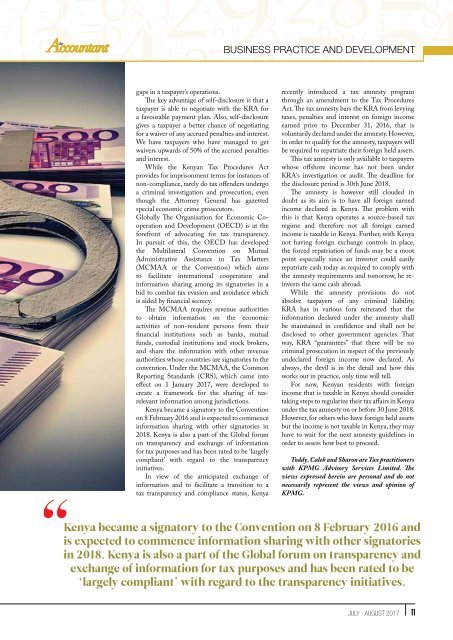The-Accountant-Jul-Aug-2017
You also want an ePaper? Increase the reach of your titles
YUMPU automatically turns print PDFs into web optimized ePapers that Google loves.
Business practice and development<br />
gaps in a taxpayer’s operations.<br />
<strong>The</strong> key advantage of self-disclosure is that a<br />
taxpayer is able to negotiate with the KRA for<br />
a favourable payment plan. Also, self-disclosure<br />
gives a taxpayer a better chance of negotiating<br />
for a waiver of any accrued penalties and interest.<br />
We have taxpayers who have managed to get<br />
waivers upwards of 50% of the accrued penalties<br />
and interest.<br />
While the Kenyan Tax Procedures Act<br />
provides for imprisonment terms for instances of<br />
non-compliance, rarely do tax offenders undergo<br />
a criminal investigation and prosecution, even<br />
though the Attorney General has gazetted<br />
special economic crime prosecutors.<br />
Globally <strong>The</strong> Organisation for Economic Cooperation<br />
and Development (OECD) is at the<br />
forefront of advocating for tax transparency.<br />
In pursuit of this, the OECD has developed<br />
the Multilateral Convention on Mutual<br />
Administrative Assistance in Tax Matters<br />
(MCMAA or the Convention) which aims<br />
to facilitate international cooperation and<br />
information sharing among its signatories in a<br />
bid to combat tax evasion and avoidance which<br />
is aided by financial secrecy.<br />
<strong>The</strong> MCMAA requires revenue authorities<br />
to obtain information on the economic<br />
activities of non-resident persons from their<br />
financial institutions such as banks, mutual<br />
funds, custodial institutions and stock brokers,<br />
and share the information with other revenue<br />
authorities whose countries are signatories to the<br />
convention. Under the MCMAA, the Common<br />
Reporting Standards (CRS), which came into<br />
effect on 1 January <strong>2017</strong>, were developed to<br />
create a framework for the sharing of taxrelevant<br />
information among jurisdictions.<br />
Kenya became a signatory to the Convention<br />
on 8 February 2016 and is expected to commence<br />
information sharing with other signatories in<br />
2018. Kenya is also a part of the Global forum<br />
on transparency and exchange of information<br />
for tax purposes and has been rated to be ‘largely<br />
compliant’ with regard to the transparency<br />
initiatives.<br />
In view of the anticipated exchange of<br />
information and to facilitate a transition to a<br />
tax transparency and compliance status, Kenya<br />
recently introduced a tax amnesty program<br />
through an amendment to the Tax Procedures<br />
Act. <strong>The</strong> tax amnesty bars the KRA from levying<br />
taxes, penalties and interest on foreign income<br />
earned prior to December 31, 2016, that is<br />
voluntarily declared under the amnesty. However,<br />
in order to qualify for the amnesty, taxpayers will<br />
be required to repatriate their foreign held assets.<br />
This tax amnesty is only available to taxpayers<br />
whose offshore income has not been under<br />
KRA‘s investigation or audit. <strong>The</strong> deadline for<br />
the disclosure period is 30th June 2018.<br />
<strong>The</strong> amnesty is however still clouded in<br />
doubt as its aim is to have all foreign earned<br />
income declared in Kenya. <strong>The</strong> problem with<br />
this is that Kenya operates a source-based tax<br />
regime and therefore not all foreign earned<br />
income is taxable in Kenya. Further, with Kenya<br />
not having foreign exchange controls in place,<br />
the forced repatriation of funds may be a moot<br />
point especially since an investor could easily<br />
repatriate cash today as required to comply with<br />
the amnesty requirements and tomorrow, he reinvests<br />
the same cash abroad.<br />
While the amnesty provisions do not<br />
absolve taxpayers of any criminal liability,<br />
KRA has in various fora reiterated that the<br />
information declared under the amnesty shall<br />
be maintained in confidence and shall not be<br />
disclosed to other government agencies. That<br />
way, KRA “guarantees” that there will be no<br />
criminal prosecution in respect of the previously<br />
undeclared foreign income now declared. As<br />
always, the devil is in the detail and how this<br />
works out in practice, only time will tell.<br />
For now, Kenyan residents with foreign<br />
income that is taxable in Kenya should consider<br />
taking steps to regularize their tax affairs in Kenya<br />
under the tax amnesty on or before 30 June 2018.<br />
However, for others who have foreign held assets<br />
but the income is not taxable in Kenya, they may<br />
have to wait for the next amnesty guidelines in<br />
order to assess how best to proceed.<br />
Toddy, Caleb and Sharon are Tax practitioners<br />
with KPMG Advisory Services Limited. <strong>The</strong><br />
views expressed herein are personal and do not<br />
necessarily represent the views and opinion of<br />
KPMG.<br />
Kenya became a signatory to the Convention on 8 February 2016 and<br />
is expected to commence information sharing with other signatories<br />
in 2018. Kenya is also a part of the Global forum on transparency and<br />
exchange of information for tax purposes and has been rated to be<br />
‘largely compliant’ with regard to the transparency initiatives.<br />
JULY - AUGUST <strong>2017</strong> 11

















